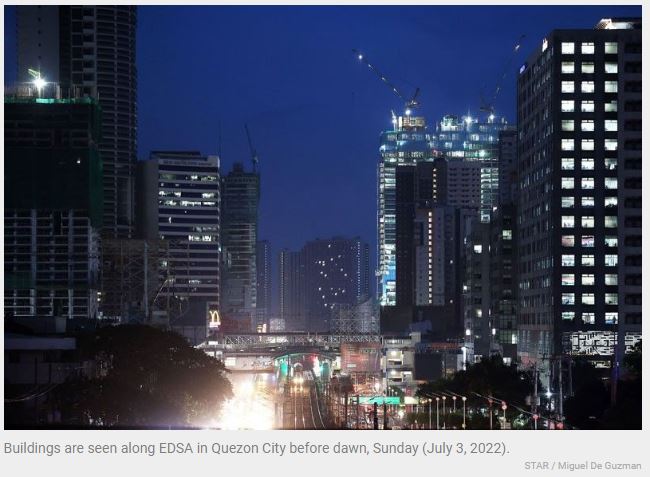Philippines: Credit growth steadies at 12% amid rate hikes
MANILA, Philippines — Big banks sustained a double-digit credit growth amid the aggressive rate hikes by the Bangko Sentral ng Pilipinas (BSP) to anchor inflation expectations and avoid a breach in the two to four percent target range next year.
Preliminary data released by the BSP showed that the increase in loans extended by universal and commercial banks remained steady at 12 percent in July. This was the fastest since the 12.7 percent recorded in April 2020.
Loans disbursed by universal and big banks amounted to P10.21 trillion in end- July this year, P1.09 trillion higher than the P9.12 trillion recorded in end-July last year.
“The sustained growth in bank lending and liquidity will support the recovery of economic activity and domestic demand. Looking ahead, the BSP will continue to ensure that liquidity and credit dynamics remain in line with the BSP’s price and financial stability objectives,” the BSP said.
Michael Ricafort, chief economist at Rizal Commercial Banking Corp., said the double-digit loan growth booked by universal and commercial banks has become one of the bright spots in the Philippine economy and also fundamentally supports faster gross domestic product (GDP) growth.
The economy expanded by 7.8 percent in the first half despite the disappointing 7.4-percent growth in the second quarter, slower than the 8.2 percent recorded in the first quarter.
Despite the local policy rate hikes by the Monetary Board, Ricafort said credit growth again posted a positive year-on-year growth for the 12th consecutive month and picked up for the 15th straight month as the economy reopened further toward greater normalcy from strict COVID-19 lockdowns.
Ricafort said President Marcos signaled that the government has no plans of implementing strict COVID quarantine and lockdown protocols.
The economist of the Yuchengco-led bank also attributed the sustained credit growth in July to some borrowers who rushed their financing activities ahead of the increase in long-term interest rate costs locally and globally amid elevated inflation and the hawkish US Federal Reserve.
Since the liftoff that started last May 19, the BSP has raised interest rates by 175 basis points, bringing the reverse repurchase rate to 3.75 percent from an all-time low of two percent.
“Some borrowers also hedged funding requirements in preparation for better economic conditions ahead, as well to hedge versus external risk factors that are beyond the country’s reasonable control such as the more aggressive Fed rate hikes largely brought about by the continued Russian war with Ukraine that led to relatively higher global oil and other commodity prices,” Ricafort said.
Data from the BSP showed loans to production activities increased by 11.6 percent to P8.96 trillion in July from P8.04 trillion in the same period last year and accounted 87.9 percent of the total loans disbursement.
The real estate sector posted a 14.6-percent increase to P2.09 trillion and accounted for 20.5 percent of the total disbursements followed by the manufacturing sector with a 16.2-percent growth to P1.17 trillion for a share of 11.4 percent as well as wholesale and retail trade, repair of motor vehicles and motorcycles with a 9.3-percent increase to P1.16 trillion for a share of 11.4 percent.
Likewise, loans extended to the electricity, gas, steam and air-conditioning supply sector went up by 6.8 percent to P1.11 trillion for a 10.9-percent share.
Consumer loans, data showed, also grew at a faster rate of 14.7 percent to P934.71 billion for a share of 9.2 percent of the total loans as of end-July.
Credit card loans surged by 21 percent to P487 billion, while auto loans eked out a one percent growth to P25.89 billion.
Fitch Ratings earlier said it expected credit growth in the Philippines tapering off in the second half amid the central bank’s ongoing tightening cycle to anchor inflation expectations.
In its non-rating action commentary titled “Philippine Banking Sector to Sustain Improving Profitability as Rate Rises,” the debt watcher said high inflation and the monetary policy response of the BSP are likely to dampen loan demand for the rest of the year.
“We expect credit growth to taper in the second half as demand is curbed by inflation and a 175-basis point year-to-date increase in the policy rate,” Fitch said.
Meanwhile, the BSP also reported a seven percent increased in domestic liquidity to P15.4 trillion in end-July, slower than the 7.2-percent expansion in June.
Source: https://www.philstar.com/business/2022/09/01/2206474/credit-growth-steadies-12-amid-rate-hikes


 English
English




